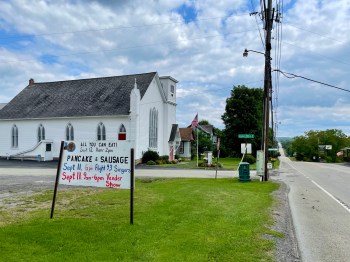Penn State penalty hits business’s bottom line
Tess Vigeland: The NCAA fined Penn State University $60 million today. The money part of the penalty for what the NCAA chief Mark Emmert called the “tragically unnecessary” child molestation scandal involving one of the school’s coaches, Jerry Sandusky. Beyond that, the college sports governing body voided the team’s victories for the past 14 seasons and banned it from post-season bowl games for four years.
Beyond the big fine and the serious damage to the university’s reputation, the financial impact is expected to ripple across the area’s economy for years. Here’s our senior business correspondent Bob Moon.
Bob Moon: Don’t tell the people who live in and around State College, Pa., that it’s “only a game.” Penn State football is a key part of their livelihoods. Last year, average attendance was more than 104,000. When those people flock to home games six or seven weekends each fall, they also pack restaurants and stores. Hotel rooms can go for $300 to $400 a night.
Which explains why Betsey Howell is grateful the football program wasn’t suspended outright. She heads the Central Pennsylvania Visitors and Convention Bureau.
Betsey Howell: I think this is a harsh penalty, but it could have been worse, had they taken away their opportunity to even play at all.
How much would that have cost the local economy? By one estimate, the football program generates more than $160 million in business every year. That might be easier to make up if the team were located in Los Angeles or Chicago.
But at the University of Chicago, sports economist Allen Sanderson says it’s not so easy in a small town. Now the games can go on, though, loyal fans and alumni could, at least initially, help soften the blow.
Allen Sanderson: If 80,000 fans show up instead of 100, and you’re still employing about the same amount of workers inside the stadium and contiguous to it — hotels, restaurants — it’s not like nobody’s going to go to the games.
Sanderson still worries that four long years of reduced scholarships and weakened recruiting efforts could yet end up being bad for business.
Sanderson: One has to admit straight up that Penn State won’t be as competitive on the field for several years — many years. Are people willing to come to watch a, you know, I don’t want to say inferior product, but a less stellar product than they have in the past?
Sanderson says the program could end up with a kind of death penalty — death by a thousand cuts.
I’m Bob Moon for Marketplace.
There’s a lot happening in the world. Through it all, Marketplace is here for you.
You rely on Marketplace to break down the world’s events and tell you how it affects you in a fact-based, approachable way. We rely on your financial support to keep making that possible.
Your donation today powers the independent journalism that you rely on. For just $5/month, you can help sustain Marketplace so we can keep reporting on the things that matter to you.


















